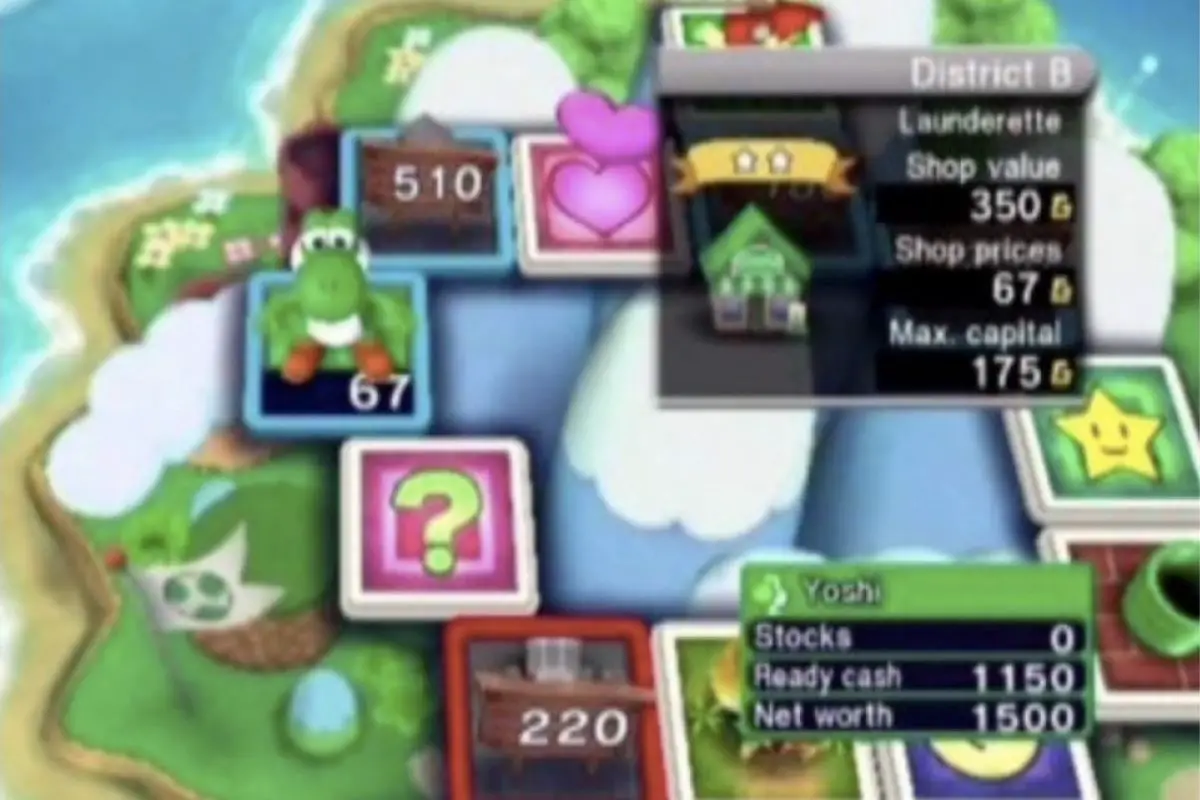One of the least known games in the Nintendo Wii library is the board game Fortune Street. The game was first released in Japan in 1994 on the Nintendo Famicom consoles. However, the game did not find its way to international markets until its Wii release in 2011. Since then, the game has been marketed a bit more; it can be found and downloaded on the App Store, but it’s never been popular, especially when compared to Monopoly.
Overwhelming Competition
Fortune Street was neither showcased nor mentioned during the 2011 Nintendo Direct. To be fair, 2011 was a big year for Nintendo — Legend of Zelda was celebrating its 25th anniversary with the release of Ocarina of Time 3D and Skyward Sword. On top of that, Nintendo’s next console, the Wii U, was showcased at E3, so smaller games like Fortune Street had little room in the spotlight, although a trailer was prepared for the event.
I wasn’t even aware of Fortune Street’s existence until a year after, when I found it at Target. I never watched or read anything about it, and I liked to think that at the time, I was fairly in the know about new titles, like Super Mario 3D Land or Star Fox 64 3D, especially with the Nintendo Channel to help keep me in the loop.
However, Fortune Street slipped right through the cracks. In retrospect, maybe that should be expected for a game on an outgoing console. Even now, not many people seem to know about Fortune Street, much less play it, which is too bad really, because it’s one of the most complex and challenging board games I’ve ever played.
Common Game Mechanics
The Wii game technically has two versions: the Easy Rules and the Original Rules, and the Standard Rules. The Easy Rules play much like a game of Monopoly, as many others have observed.
As you move across the board, you buy stores that are divided into districts and your opponents are charged a set amount for landing on a shop you own. You can invest money to make your shops more powerful and charge more from your opponents, and your shops get better when you own more of them in a district. You can also trade shops with other opponents.
Every time you go around the board, you earn money until opponents go bankrupt or someone reaches the goal amount. Fortune Street has that in common with Monopoly, but even in the Easy Rules, there are twists that help distinguish it from Monopoly.
Unique Game Mechanics
Fortune Street requires players to collect four suits spread across the board, and they have to return to the bank to get paid — as opposed to Monopoly, where players are paid every time they cross the starting space.
Fortune Street allows players to steal other players’ shops by paying five times the shop’s value and forcing a buyout. Fortune Street also allows players more freedom to invest because unlike Monopoly, they don’t need every store in a district to invest in property. Each shop has a set amount of capital that the owner can invest in. Max capital also increases with the more shops a player owns in a district.
Other ways that Fortune Street is different from Monopoly is that there are take-a-break squares. When you land on one, all your shops are closed until your next turn, so you can’t make money from sales. There are also boon and boom squares where you get a commission on shop sales until your next turn.
Then there are simple Venture On spaces where you roll the die again and move. There are also minigames, like a slime race and a dart game that can provide rewards. Rewards include extra money, extra stocks, Suit Yourself cards (which stand in for uncollected suits), increases in shop value and warping. There are also punishments, like a decrease in shop value.
The main way to win the Easy Rules is to buy property, invest to raise prices so it’s harder for your shops to be bought out, count on opponents landing on your shops to make money and collect the four suits needed for promotion paychecks — all while avoiding your opponents’ shops when possible. In the Standard Rules, however, these gameplay elements are still present, but they barely even scratch the surface of the game.
The Standard Rules has the one gameplay mechanic that simultaneously distinguishes itself from Monopoly, and, in my opinion, makes the game worth playing. It has a stock market.
Game of Stocks
Every time players land on the bank or a stock office space, they have the option of investing money to buy stocks in certain districts. That’s where the gameplay gets interesting. A player’s first instinct can be to invest in either a district with many of their shops or a district where they can invest a lot of max capital. However, it can be difficult for players to keep their financial footing if they’re focused on districts where only they are investing, at least early on.
More often than not, you’ll be counting on your invested stock to pay the bills because as stocks in a district increase, the more the stocks you own in that district are worth and the higher your net worth becomes. So, it can be beneficial to invest in a district where your opponents are investing early on, so your stocks are worth more and you have more money in the market to draw from. Plus, selling stocks in a district where your opponents have stock can lower prices in the district, making your competitors lose money.
One thing that will make your net worth skyrocket is by investing in your shops in districts where you have a lot of stocks. You still have to be careful that your competitors don’t have more stock, so they don’t freeload off your investments.
Conclusion
There is no surefire way to win Fortune Street. The game requires strategy, foresight and adaptability. Anybody who likes board games with strategy like Monopoly should certainly try their hand at Fortune Street.
















